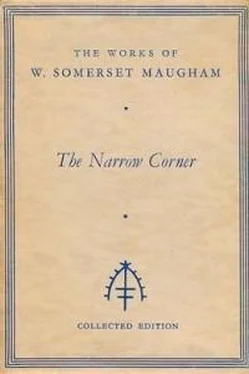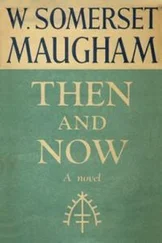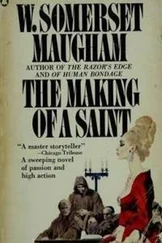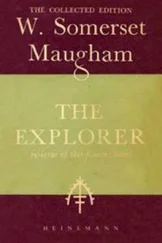“A very pretty young woman,” said the doctor.
“She was like a mother to me. You can’t imagine how kind she was. I used to spend all my spare time up there, and if I didn’t go for a few days because I was afraid of abusing their hospitality she’d come down and fetch me herself. We Danes, you know, we think the Dutch are rather dull and heavy, and it was a godsend for me to have that house to go to. Old Swan used to like talking Swedish to me.” Erik gave a little laugh. “He’d forgotten most of it, he talks half Swedish, half English, and Malay words thrown in and bits of Japanese; at first I had a job to understand. Funny how a man can forget his native language. I’ve always liked the English. It was fine for me to have long talks with Frith. You wouldn’t expect to find a man with that education in a place like this.”
“I was wondering how he ever found his way here.”
“He’d read about it in some old travel book. He’s told me he wanted to come ever since he was a kid. It’s a funny thing, he’d got it into his head that it was the one place in the world he wanted to live in. And I’ll tell you what’s strange, he’d forgotten the name of it; he could never find again the book in which he’d read about it; he just knew there was an island all by itself in a little group somewhere between Celebes and New Guinea, where the sea was scented with spices and there were great marble palaces.”
“It sounds more like the sort of thing you read about in ‘The Arabian Nights’ than in a book of travel.”
“That’s what a good many people expect to find in the East.”
“Sometimes they do,” murmured the doctor.
He thought of the noble bridge that spanned the river at Fu–chou. There was a press of traffic on the Min, great junks with eyes painted on their prows so that they could see the way to go, wupans with their rattan hoods, frail sampans and chugging motor–boats. On the barges dwelt the turbulent river–folk. In mid–stream on a raft two men, wearing nothing but a loin cloth, fished with cormorants. It was a sight you could watch for an hour at a time. The fisherman sent his bird into the water; it dived, it caught; as it rose to the surface he drew it in by a string tied to its leg; then, while it struggled, angrily flapping its wings, he seized it by the throat and made it disgorge the fish it had seized. After all it was just such a fisherman, fishing in his different Arab way, to whom a casual chance brought such amazing adventures.
The Dane continued:
“He came out East when he was twenty–four. It took him twelve years to get here. He asked everyone he met if they’d heard of the island, but you know, in the F.M.S. and in Borneo, they don’t know much about these parts. He was a bit of a rolling–stone when he was a young chap and he wandered from place to place. You heard what old Swan said to him and I guess it was true. He never kept a job very long. He got here at last. The skipper of a Dutch ship told him about it. It didn’t sound very much like the place he was looking for, but it was the only island in the Archipelago that answered to the description at all, and he thought he’d come and look at it. When he landed he hadn’t much beside his books and the clothes he stood up in. At first he couldn’t believe it was the right place; you’ve seen the marble palaces, you’re sitting in one of them now.” Erik looked round the room and laughed. “You see, he’d pictured them to himself all those years like the palaces on the Grand Canal. Anyhow, if it wasn’t the place he was looking for it was the only place he could find. He shifted his standpoint, if you understand what I mean, and forced the reality to tally with his fancy. He came to the conclusion that it was all right. Because they’ve got marble floors and stucco columns he really thinks they are marble palaces.”
“You make him out a wiser man than I thought he was.”
“He got a job here, there was more trade then than there is now; after that, he fell in love with old Swan’s daughter and married her.”
“Were they happy together?”
“Yes. Swan didn’t like him much. He was pretty active in those days and he was always concocting some scheme or other. He could never get Frith to get a move on. But she worshipped him. She thought he was wonderful. When Swan got too old, she ran the estate and looked after things and made both ends meet. You know, some women are like that. It gave her a sort of satisfaction to think of Frith sitting in his den with his books, reading and writing and making notes. She thought him a genius. She thought everything she did for him was only his due. She was a fine woman.”
The doctor reflected on what Erik told him. What a picture of a strange life this offered to the fancy! The shabby bungalow in the nutmeg plantation, with the immensely tall kanari trees; that old pirate of a Swede, ruthless and crotchety, brave adventurer in the soulless deserts of hard fact; the dreamy, unpractical schoolmaster, lured by the mirage of the East, who like—like a coster’s donkey let loose on a common, wandered aimlessly in the pleasant lands of the spirit, browsing at random; and then, the great blonde woman, like a goddess of the Vikings, with her efficiency, her love, her honesty of mind, and surely her charitable sense of humour, who held things together, managed, guided and protected those two incompatible men.
“When she knew she was dying she made Louise promise to look after them. The plantation belongs to Swan. Even now it brings in enough to keep them all. She was afraid that after she was gone the old man would turn Frith out.” Erik hesitated a little. “And she made me promise to look after Louise. It hasn’t been very easy for her, poor child. Swan is like a cunning old monkey. He’s up to any mischief. His brain in a way is as active as ever it was, and he’ll lie and plot and intrigue just to play some silly little trick on you. He dotes on Louise. She’s the only person who can do anything with him. Once, just for fun, he tore some of Frith’s manuscripts into tiny fragments. When they found him he was surrounded by a snow–fall of little bits of paper.”
“No great loss to the world, I daresay,” smiled the doctor, “but exasperating to a struggling author.”
“You don’t think much of Frith?”
“I haven’t made up my mind about him.”
“He’s taught me so much. I shall always be grateful to him. I was only a kid when I first came here. I’d been to the university at Copenhagen, and at home we’d always cared for culture; my father was a friend of George Brandes, and Holger Drachmann, the poet, used often to come to our house; it was Brandes who first made me read Shakespeare, but I was very ignorant and narrow. It was Frith who made me understand the magic of the East. You know, people come out here and they see nothing. Is that all? they say. And they go home again. That fort I took you to see yesterday, just a few old grey walls overgrown with weeds. I shall never forget the first time he took me there. His words built up the ruined walls and put ordnance on the battlements. When he told me how the governor had paced them week after week in sickening anxiety, for the natives, in the strange way they have in the East of knowing things before they can possibly be known, were whispering of a terrible disaster to the Portuguese, and he waited desperately for the ship that would bring news; and at last it came, and he read the letter which told him that King Sebastian, with his splendid train of nobles and courtiers, had been annihilated at the battle of Alcacer, and the tears ran down his old cheeks, not only because his king had met a cruel death, but because he foresaw that the defeat must cost his country her freedom; and that rich world they had discovered and conquered, those innumerable islands a handful of brave men had seized for the power of Portugal, must pass under the dominion of foreigners—then, believe me or not, I felt a lump in my throat, and for a little while I couldn’t see because my eyes were blurred with tears. And not only this. He talked to me of Goa the Golden, rich with the plunder of Asia, the great capital of the East, and of the Malabar Coast and Macao, and Ormuz and Bassora. He made that old life so plain and vivid that I’ve never since been able to see the East but with the past still present to–day. And I’ve thought what a privilege it was that I, a poor Danish country boy, should see all these wonders with my own eyes. And I think it’s grand to be a man when I think of those little swarthy chaps from a country no bigger than my own Denmark who, by their dauntless courage, their gallantry, their ardent imagination, held half the world in fee. It’s all gone now and they say that Goa the Golden is no more than a poverty–stricken village; but if it’s true that the only reality is spirit, then somehow that dream of empire, that dauntless courage, that gallantry, live on.”
Читать дальше
Конец ознакомительного отрывка
Купить книгу










